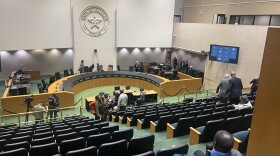The U.S. Immigration and Customs Enforcement 287(g) task force program is up for review by a joint committee in Dallas at the request of Mayor Eric Johnson.
The program reimburses police departments to train and use local officers for immigration enforcement, which includes the arrest and deportation of immigrants. The reimbursement is for the annual salary and benefits of each eligible officer, and includes overtime coverage of up to 25% of their annual salary.
Chelsie Kramer, the Texas state organizer for the nonpartisan American Immigration Council, said the program gives up local control of city and state law enforcement agencies, handing it to the federal government.
"And I think that's what's really striking about the 287(g) agreements, especially things like the task force model, is that you're really, truly deputizing patrol officers to be able to question and detain people about their immigration status during field operations," Kramer said. Her organization advocates for immigrants across the nation.
The Community Police Oversight Board and Dallas residents have raised concerns about a partnership with ICE since the federal agency ramped up detainments over the summer.
Dallas Police Chief Daniel Comeaux recently turned down $25 million offered by ICE to join the program. He told the oversight board that he didn't want to bring unnecessary attention to the city when DPD has had minimal interactions with ICE.
"We don't need that attention," Comeaux told the board last month. "We don't want to deal with that smoke."
But Johnson later called for the Public Safety and Government Efficiency committees to hold a joint meeting to discuss potentially joining the program.
Johnson says that money could "provide significant financial benefits to the city" and allow the city to hire more officers. The voter-approved Proposition U requires Dallas to have at least 4,000 sworn in officers, which the city has not met yet.
But least 11 out of the 14 city council members have made public statements against joining 287(g), saying immigration enforcement should be left to the federal government, not local police. They, along with Dallas residents, have expressed concerns about how joining the program could impact trust between officers and the communities they serve.
Miltonette Craig, a criminal justice professor at Sam Houston State University, told KERA that she had a similar concern.
While the $25 million in reimbursement money may seem enticing, she said not all money is good money.
Having Dallas police officers operate as ICE agents could keep marginalized groups in the city from calling DPD out of fear of being asked about their immigration status. Craig said that could lead to more crime.
"You want the community to see you as legitimate and see you as helpful and see you as an asset, as opposed to being afraid of you," Craig said.
The need to foster community trust is not new. Howard Williams, an associate professor of criminal justice at Texas State University, said police work doesn't get done without community cooperation.
"The community isn't going to cooperate with the police department unless you've got pretty good relations," Williams said. "If they don't trust you or they fear you, they're not going to want to talk to you."
Williams was a police officer for 36 years — with 11 years serving as police chief in San Marcos — before he retired in 2014.
He said police departments often get caught in the middle of the political will of the community, which impacts relationships with residents.
Good community relationships are established through police legitimacy, which means that people accept that officers have the right to do what they do and they accept the way that they go about it. With the current polarized political climate, Williams said department's are bound to make someone mad.
"So as you make one of these sides mad with you, because they don't accept that you're doing this right, you start losing legitimacy," Williams said. "Which side are you going to lose legitimacy on?"
He added that losing legitimacy could result in lack of cooperation with officers, protesting, and could put officer safety at risk.
However, ultimately a police chief has to follow the direction of their boss which is either the city council or city manager.
"They're the boss, and if that's what they tell you to do that's what you go do," Williams said. "You can grumble about it behind closed doors all you want. But in public you have to support that decision, you have to make that decision work. That's your job."
Comeaux was appointed — and his position is overseen — by City Manager Kimberly Bizor Tolbert. KERA reached out to Tolbert with questions about Comeaux's decision to turn down the $25 million from ICE, but did not receive a response after multiple follow ups over several days.
Comeaux told the Police Oversight Board that transparency and community engagement are among his priorities. This includes keeping neighborhood police officers, or NPOs, who engage with community members to handle causes of crime in their neighborhood.
That rapport with the community could be why ICE partners with local agencies instead of hiring their own officers.
Craig said federal officers don't know the lay of the land or understand community patterns like local police do. She added that inter-agency collaboration can be useful in instances like drug trafficking, but its a fine line that should not be blurred.
"But then when you blur that line, then who's in charge and who does the Constitution say is in charge?" Craig said. "Why are we not separating and being distinct?"
Got a tip? Email Megan Cardona at mcardona@kera.org.
KERA News is made possible through the generosity of our members. If you find this reporting valuable, consider making a tax-deductible gift today. Thank you!





